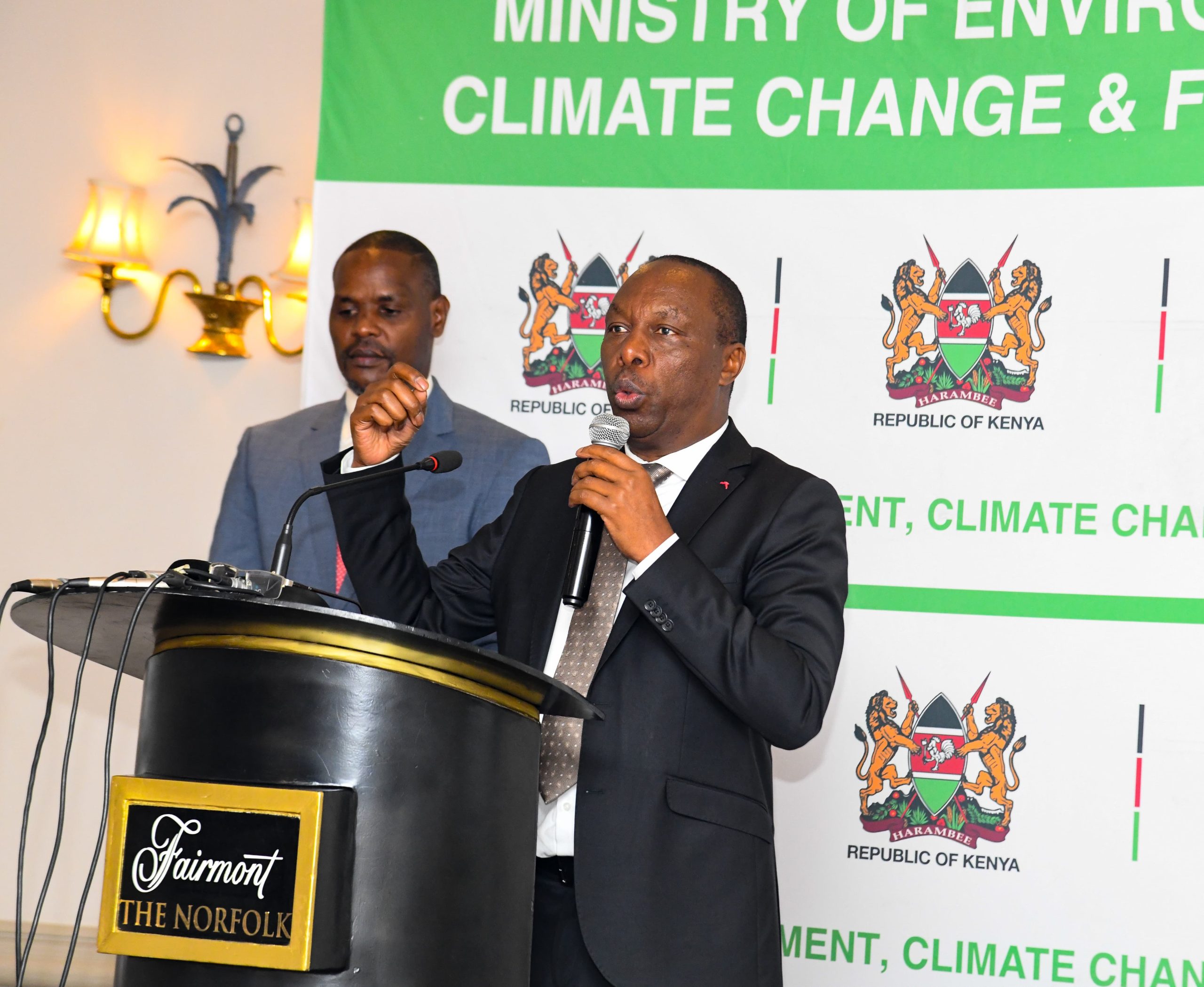
By Njeri Irungu.
Nairobi, 30 September 2025
Kenya is once again gearing up for Mazingira Day, the annual national celebration dedicated to tree growing and environmental stewardship. This year’s edition, set for 10 October 2025, carries a powerful rallying call that resonates deeply with every Kenyan: “Turudi Primo Tukadonate Fruit Trees na Kuclean Environment.” It is an appeal for all citizens to return to their former primary schools, donate fruit tree seedlings, plant them alongside pupils, and take part in cleaning school compounds and community markets.
Speaking at a media briefing in Nairobi, the Principal Secretary for Environment and Climate Change, Dr. Eng. Festus K. Ng’eno, underscored the significance of the 2025 celebrations, noting that fruit trees had been deliberately chosen for their ability to link environmental restoration with tangible benefits in nutrition, education, health, and livelihoods. “Fruit trees are a gift that keeps on giving,” he said. “They provide shade, food, vitamins, and income, while at the same time teaching children about environmental responsibility. By planting them in schools, we are nurturing both the environment and the future of our nation.”
Mazingira Day has quickly become Kenya’s flagship platform for environmental awareness since its establishment in 2024, when the Statute Law (Miscellaneous Amendments) Bill amended the Public Holidays Act to replace Utamaduni Day with this new green commemoration. What began as a symbolic day of tree planting has now grown into a movement that mobilizes government, counties, development partners, schools, and communities towards the ambitious target of growing 15 billion trees by 2032, part of the National Landscape and Ecosystem Restoration Strategy. Already, Kenyans have planted close to one billion trees since the programme’s launch in December 2022.
The 2025 edition of Mazingira Day will be marked through a dual approach. A national event will take place in Trans-Nzoia County, at Kabuyefwe Primary and Kabuyefwe Boys’ schools in Kiminini, where more than 10,000 fruit trees will be planted across 60 acres of land. The event is expected to attract thousands, including leaders, learners, alumni, development partners, cultural performers, and local communities. At the same time, decentralized celebrations will unfold across the country, coordinated through 9,127 sub-locations. In more than 35,000 public and private primary schools, alumni, teachers, students, and community members will gather to plant fruit trees, clean markets, and mentor children, united by a shared sense of responsibility to leave behind a greener and healthier environment.
The scale of ambition is unprecedented. The Ministry of Environment, Climate Change and Forestry has set a target of planting 71.14 million seedlings on that day alone, with each school expected to grow at least 2,000 fruit trees. For schools where land is scarce, surplus seedlings will be distributed to learners to plant at home, ensuring that every child carries the restoration journey forward. The Ministry has also put in place a National Planning Committee and four specialized subcommittees—covering logistics, communications, technical coordination, and resource mobilization—to oversee preparations.
The build-up to the Day is equally significant. Mazingira Day has been carefully linked with other national observances, including World Clean-Up Day on 20 September, the Chiefs’ Climate Action Day on 3 October, and the National Youth Summit. In the days leading up to 10 October, Kenyans will be encouraged to visit their schools to donate seedlings, join in clean-up campaigns, and participate in mentorship sessions and cultural exhibitions. The government is also pushing for waste segregation at source, through the recently gazetted color-coded bins, and reinforcing Extended Producer Responsibility regulations. The broader goal is not only to plant trees but also to embed a culture of proper waste management, recycling, and circular economy innovations that create green jobs for the youth and position Kenya as a regional hub for sustainable industries.
Beyond the technical details, Mazingira Day 2025 carries an emotional and symbolic weight. By urging alumni to return to their primary schools, the government is appealing to Kenyans’ earliest memories and shared experiences, weaving inter-generational bonds through environmental action. It is about parents planting alongside their children, mentors guiding pupils, and communities reconnecting with their roots while leaving a lasting legacy in the very schools where their own journeys began.
As Dr. Ng’eno reminded Kenyans, the role of the media, civil society, and the private sector is critical in amplifying the message and ensuring broad participation. “On 10th October 2025, let us all return to our schools, donate and plant fruit trees, clean our environment, and together, inspire a greener, healthier, and more sustainable Kenya,” he said.
With its focus on fruit trees, this year’s Mazingira Day promises not just another round of symbolic tree planting, but a deeply practical, citizen-driven effort that ties ecological restoration to nutrition, education, and livelihoods. If successful, it will cement Mazingira Day as a cornerstone of Kenya’s long-term environmental journey, ensuring that every tree planted becomes both a source of life and a living classroom for generations to come.







